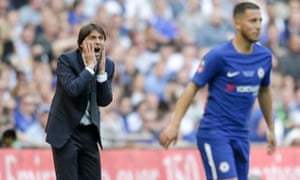Chelsea’s owner of 15 years, Roman Abramovich, pulled the plug on the £1bn redevelopment of Stamford Bridge on Thursday having grown infuriated by the Home Office delaying the renewal of his investor’s visa, a move born of heightened tensions between Britain and Russia. The oligarch’s decision has been interpreted by some as the first public indication his enthusiasm for the club is on the wane. On the football side, doubts surround the future of Antonio Conte and the identity of his potential successor, while the team’s star player, Eden Hazard, awaits evidence the club shares his ambitions to challenge for the Premier League title. We address the key questions at a club in flux.
What is the significance of the postponement of the stadium redevelopment?
The revamp of Stamford Bridge was Abramovich’s pet project. Increasing the capacity from 41,631 to 60,000, with its extra hospitality and commercial opportunities, would have driven Chelsea further along the road to long-term sustainability, allowing them to compete more easily with elite rivals within the restrictions of financial fair play regulations, while also providing an eye-catching legacy of the Russian’s tenure. The stadium is not even in the 60 biggest grounds in Europe. Yet Abramovich is understandably reluctant to invest heavily in a major project in the capital of a country where he has been denied a visa. The only problem is that, by putting the build on hold – and shelving the estimated £22m in community benefits associated with the plans – the owner has effectively opted against addressing the issue of long-term sustainability, and cast some doubt on his plans for the club.
Has he fallen out of love with London?
Apparently not, though he clearly has his issues with the British government. Chelsea insist Abramovich is as committed as ever to a club in which he has invested £1.17bn and into which he continues to pour money – £34m in the 2016-17 accounts – and that opting out of the stadium development does not have implications on the football side, though that will be tested in the weeks to come. The Russian is moving to Tel Aviv having gained Israeli citizenship and has reportedly withdrawn his British visa application now he will be able to visit for up to six months at a time (although not work in the UK). Being based abroad is hardly an issue. The Premier League’s elite clubs are all overseen by overseas owners. Yet if Abramovich makes his home in Israel, the stadium plans are shelved forever and Chelsea’s yearning for sustainability is never really addressed, what is his motivation for owning the club? Maybe he will still benefit from the profile but the possibility of a sale would surely be mooted. “If the visa issue isn’t resolved I think anything could happen,” said the club’s former chief executive Trevor Birch. “There’s obviously a great deal of concern around at the moment. But it’s eminently sellable as a club. With TV rights increasing, if Manchester United are valued at over £3bn then Chelsea would be valued at around £1.5bn, and very attractive.”

Where does all this leave the managerial situation?
Matters on the pitch feel almost trivial in contrast with the ownership issue but there is a desperate need to address the immediate uncertainty. Players emerged from their victory in the FA Cup final suggesting enough was enough, and some clarity is required over Conte’s future. He has secured major honours in each of his two seasons at Chelsea and is under contract for a further year, yet expects to be sacked having grated with the hierarchy for more than a season. He is none the wiser, however, as to whether he will be in situ when the players report back in July. Talks have taken place with Maurizio Sarri, who employed an England-based representative to smooth a move to the Premier League, but Chelsea are reluctant to pay for his release from his Napoli contract given the Italian club have already appointed his successor in Carlo Ancelotti. Some within the club have pointed to unsavoury incidents in Sarri’s past, and to the reality he is yet to claim a major honour. Laurent Blanc’s candidature has been discussed, though the Frenchman would feel like a stop-gap. Luis Enrique and Leonardo Jardim were the others in the frame, and Avram Grant’s name has cropped up, which would dismay the support. But there is no obvious consistency to the strategy in terms of the style of football any of the candidates might play. The process seems muddled and forced on the club by a fallout with Conte.
Is it affecting player recruitment or contract negotiations?
The director Marina Granovskaia has been overseeing recruitment since Michael Emenalo’s resignation last November – no replacement has been made, though talks have taken place with prospective candidates – but is apparently in Russia and will return to work next week. Chelsea can pursue players who fit their criteria and run their favourites past the manager at a later date, and the wheels are in motion in terms of incoming transfers. Yet time is ticking down to that early deadline in August and Hazard will want evidence the “good players” he had stipulated must be purchased are being secured. Failure could have implications on whether Chelsea can tie their top performer down to a new contract. It is hardly helpful, either, that Thibaut Courtois will not address his contractual situation until after the World Cup as he enters the final 12 months of his deal. Chelsea have played the market shrewdly over recent years, raising funds through sales from first team and loan players alike. Having to replace their goalkeeper would be another unwelcome headache.